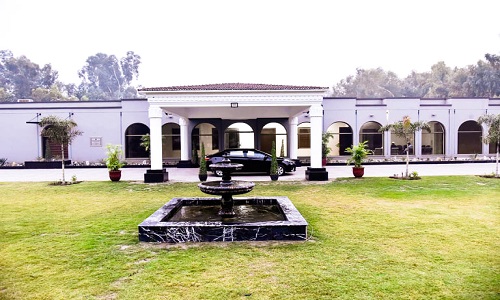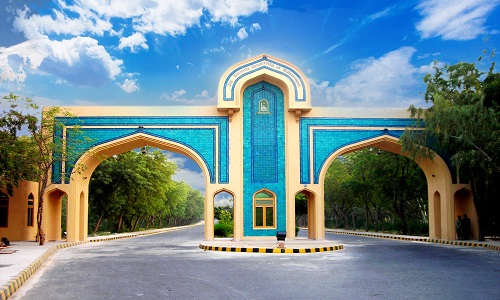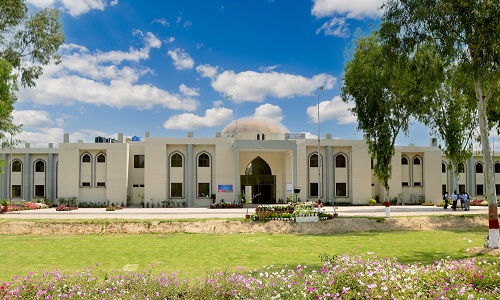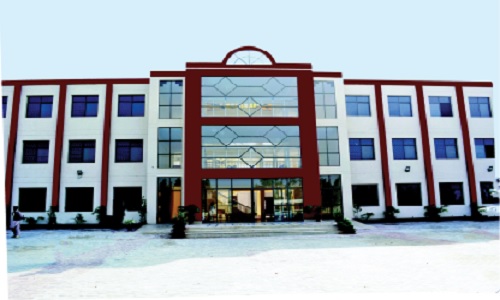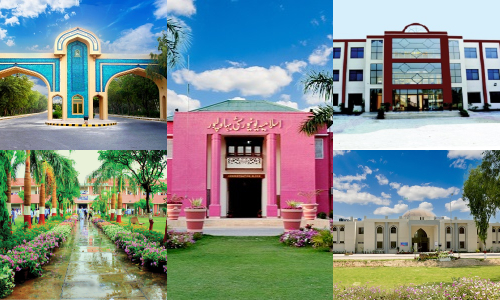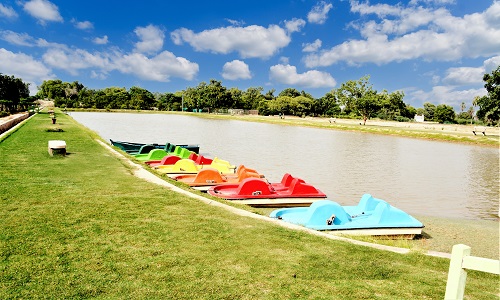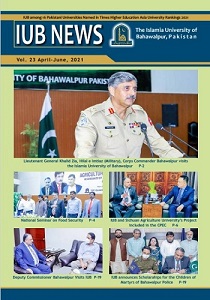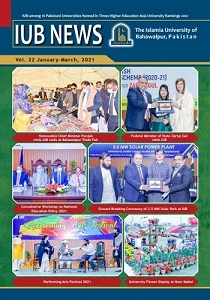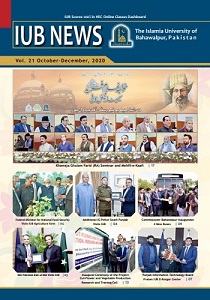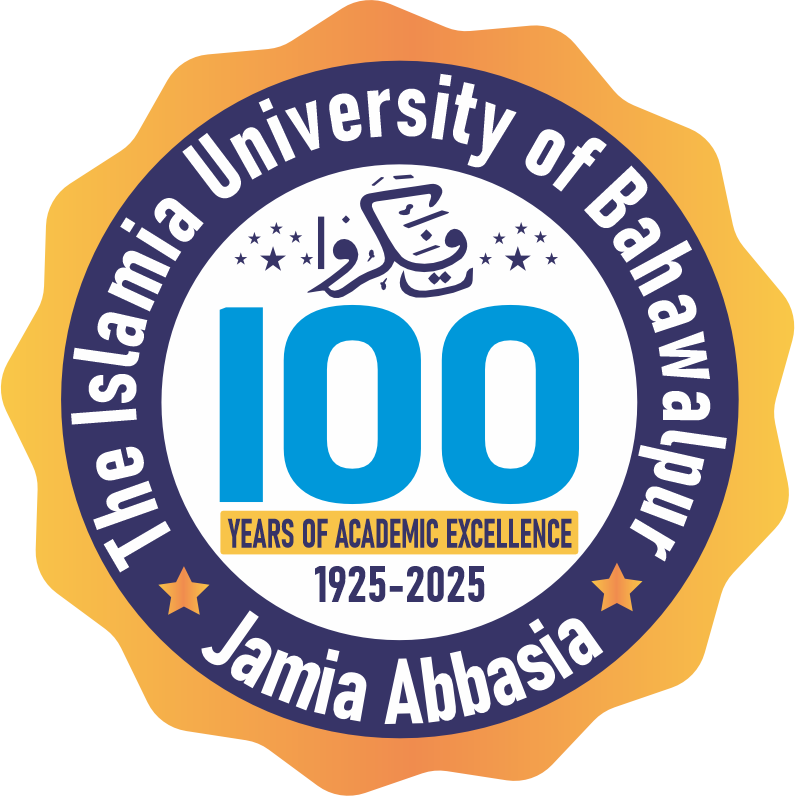BS Biomedical Engineering Technology
In the ever-evolving landscape of technological advancements, the field of Biomedical Engineering Technology has emerged as a beacon of innovation, paving the way for a healthier and more promising future. In the Spring of 2021, under the visionary leadership of the Department of Information and Communication Engineering, the program for BS Biomedical Engineering Technology was conceived to bridge the gap between technology and healthcare. This groundbreaking initiative was designed to prepare the next generation of pioneers, innovators, and problem solvers, poised to revolutionize the biomedical industry.
As the program gained momentum, a transformative development occurred. With a steadfast dedication to advancing technological education and staying attuned to the ever-evolving industry demands, the inception of Sir Sadiq Institute of Technology (SSIT) took place in 2023. This remarkable institute, devoted to covering a broad spectrum of technological programs, marks a monumental step towards shaping the future of technological education in our region.
Now, as we embark on this journey, the BS Biomedical Engineering Technology program stands at the forefront, offering students a unique blend of theoretical knowledge and hands-on experience. It equips them with the tools and skills needed to revolutionize the world of healthcare technology, ultimately contributing to the betterment of society.
At the intersection of technology and healthcare, the future awaits, and with the BS Biomedical Engineering Technology program, you are not just a student; you are a pioneer in the making. Join us in embracing the possibilities and shaping the future of healthcare technology.
Key Highlights of the BS Biomedical Engineering Technology Program:
History | Program was launched in Spring 2021. |
Program Structure | Semester system, 4 years/08 semesters |
Curriculum | In line with NTC & HEC guidelines 136-140 Credit hours 70% practical and 30% theory |
Faculty | Total 06 faculty members 03 PhDs 03 are pursuing PhD from IUB |
Laboratories | 05 dedicated well-equipped labs 05 shared labs Trained & qualified lab staff |
OBE System | Adopted in Sping-2021 semester |
Faculty
BS Biomedical Engineering Technology
Dr. Khan Bahadar Khattak (Associate Professor / Coordinator)
Dr. Muhammad Nawaz Abbasi (Assistant Professor)
Dr. Muhammad Abdullah Sandhu (Lecturer)
Engr. Syed Muhammad Hammad Hassan Rizvi (Assistant Professor)
Engr. Amir Akram (Assistant Professor)
Engr. Syed Hafiz M. Abdur Rehman Yousaf (Lecturer)
Engr. Zulfiqar Ahmad (Lecturer)
Outcome Based Education
Program Educational Objectives (PEOs)
The program educational objectives (PEOs) are the statements to describe the career and professional accomplishments that the program is preparing graduates to achieve. The PEOs of the BS Biomedical Engineering Technology program are consistent with Faculty of Engineering & Technology vision and mission.
PEO 1: Graduates will apply biomedical engineering technology foundational knowledge to address broadly defined problems through design, analysis, and investigation.
PEO 2: Graduates will use modern tools and techniques in biomedical engineering technology field to offer economically viable, environmentally sustainable, and socially acceptable solutions to benefit society.
PEO 3: Graduates will foster ethical values, enhance their teamwork abilities, and develop project management skills to excel in response to changing professional requirements.
Program Learning Outcomes (PLOs)
The Program Learning Outcomes (PLOs) describe what students are expected to know and be able to do by the time of graduation. These relate to the knowledge, skills and attitude that the students acquire while progressing through the program. The BS Biomedical Engineering Technology program has adopted the twelve program learning outcomes (graduate attributes) as defined by NTC in Program Accreditation Policy and Procedures Manual 2023. Following are the list of twelve PLOs:
Engineering Technology Knowledge: An ability to apply knowledge of mathematics, natural science, engineering technology fundamentals, and engineering technology specialization, to define and applied engineering technology procedures, processes, systems or methodologies.
Problem Analysis: An ability to identify, formulate, research literature, and analyze Broadly Defined Engineering Technology Problems to reach substantiated conclusions, using analytical tools appropriate to the discipline or area of specialization.
Design and Development of Solutions: An ability to design solutions for Broadly Defined Engineering Technology Problems that help design of systems, components or processes that meet specified needs, while being cognizant of public health and safety issues, and conscious of cultural, societal, and environmental considerations.
Investigation: An ability to investigate Broadly Defined Engineering Technology Problems by locating, searching, and selecting relevant data from codes, data bases and literature, and finally, by designing and conducting experiments to provide valid conclusions.
Modern Tool Usage: An ability to select and apply appropriate techniques, resources, modern technology, and IT tools, including prediction and modeling, to Broadly Defined Engineering Technology Problems.
The Engineering Technologist and Society: An ability to understand the societal, health, safety, legal and cultural issues, and the consequent responsibilities relevant to engineering technology practice and solutions to Broadly Defined Engineering Technology problems.
Environment and Sustainability: An ability to understand and evaluate the sustainability and impact of engineering technology work in the solution of Broadly Defined Engineering Technology Problems in societal and environmental contexts.
Ethics: Understand and commit to professional ethics and responsibilities and norms of engineering technology practice.
Individual and Team Work: An ability to function effectively as an individual, and as a member or leader in diverse teams.
Communication Skills: An ability to communicate effectively on Broadly Defined Engineering Technology activities with engineering technologist community, and with society at large, by comprehending and writing effective reports and design documents, make effective presentations, and give and receive clear instructions.
Project Management: An ability to demonstrate knowledge and understanding of engineering technology management principles and apply these to one’s own work, as a member or leader in a team, and to manage projects in multidisciplinary environments.
Lifelong Learning: An ability to recognize the need for and engage in independent and life-long learning in engineering technologies.
Mapping of PLOs and PEOs
Sr. | PLOs | PEOs |
PEO-1 | PEO-2 | PEO-3 |
1 | Engineering Technology Knowledge | | | |
2 | Problem Analysis | | | |
3 | Design/Development of Solutions | | | |
4 | Investigation | | | |
5 | Modern Tool Usage | | | |
6 | The Engineering Technologist and Society | | | |
7 | Environment and Sustainability | | | |
8 | Ethics | | | |
9 | Individual and Team Work | | | |
10 | Communication | | | |
11 | Project Management | | | |
12 | Lifelong Learning | | | |
Curriculum
1st Year Semester-I | 1st Year Semester-II |
Course Code | Course Name | Cr. Hr. | Course Code | Course Name | Cr. Hr. |
Th | Lab | Th | Lab |
MATH | 0001 | Applied Mathematics-I | 3 | 0 | BMET | 0107 | Biochemistry | 2 | 1 |
COMP | 0102 | Programming Fundamentals | 2 | 2 | PAKS | 0008 | Pakistan Studies | 2 | 0 |
BIO | 0003 | Basic Biology | 3 | 0 | MATH | 0009 | Applied Mathematics-II | 3 | 0 |
ISLA | 0004 | Islamic Studies | 2 | 0 | ELEN | 0110 | Circuit analysis | 2 | 2 |
ENGL | 0005 | Communication Skills | 3 | 0 | BMET | 0111 | Technical Drawing | 0 | 2 |
PHY | 0006 | Applied Physics | 2 | 1 | ENGL | 0012 | Technical Writing | 2 | 0 |
Total | 15 | 3 | Total | 11 | 5 |
18 | 16 |
2nd Year Semester-III | 2nd Year Semester-IV |
Course Code | Course Name | Cr. Hr. | Course Code | Course Name | Cr. Hr. |
Th | Lab | Th | Lab |
BMET | 0113 | Physiology | 2 | 1 | BMET | 0118 | Biomechanics | 2 | 1 |
ELEN | 0114 | Digital Logic Technology | 2 | 2 | MGMT | 0019 | Engineering Management and Entrepreneurship | 2 | 0 |
ELEN | 0115 | Electrical Network Analysis | 2 | 2 | BMET | 0120 | Biomedical Electronics | 2 | 2 |
BMET | 0116 | Biostats | 2 | 0 | ELEN | 0121 | Signal and Systems | 2 | 1 |
BMET | 0117 | Human Anatomy | 2 | 1 | BMET | 0122 | Clinical and Laboratory Equipment | 2 | 2 |
| | | | | | | | | |
Total | 10 | 6 | Total | 10 | 6 |
16 | 16 |
3rd Year Semester-V | 3rd Year Semester-VI |
Course Code | Course Name | Cr. Hr. | Course Code | Course Name | Cr. Hr. |
Th | Lab | Th | Lab |
BMET | 0223 | Rehabilitation Sciences | 2 | 1 | BMET | 0228 | Biomedical Equipment & Instrumentation | 2 | 1 |
BMET | 0224 | Telemedicine | 2 | 1 | BMET | 0229 | Biomedical Robotics and Artificial Intelligence | 2 | 2 |
BMET | 0225 | Biomedical Signal & Image Processing | 2 | 2 | BMET | 0230 | Biomedical Imaging | 2 | 2 |
ELEN | 0126 | Embedded Systems | 2 | 2 | BMET | 0231 | Tissue Engineering | 2 | 1 |
BMET | 0127 | Biomedical Control Systems | 2 | 1 | BMET | 0232 | Bio-Ethics and Bio safety | 2 | 0 |
| | | | | SOCI | 0033 | Psychology | 2 | 0 |
Total | 10 | 7 | Total | 12 | 6 |
17 | 18 |
4th Year Semester-VII | 4th Year Semester-VIII |
Course Code | Course Name | Cr. Hr. | Course Code | Course Name | Cr. Hr. |
Th | Lab | Th | Lab |
MGMT | 0334 | Management Sciences Elective | 2 | 0 | BMET | 0040 | Supervised Industrial Training | 0 | 15 |
BMET | 0035 | Technical Project for Biomedical Engineering-I | 0 | 3 | BMET | 0041 | Technical Project for Biomedical Engineering-II | 0 | 3 |
BMET | 0336 | Troubleshooting of Medical Devices | 0 | 1 | | | | | |
BMET | 0337 | Depth Elective-I | 2 | 0 | | | | | |
BMET | 0338 | Depth Elective-II | 2 | 1 | | | | | |
BMET | 0339 | Depth Elective-III | 2 | 1 | | | | | |
Total | 8 | 6 | Total | 0 | 18 |
14 | 18 |
| | Total Contact Hours | 236 | | | Total Credit Hours | 133 |
Taxonomy-wise PLOs Mapping with Courses of BS Biomedical Engineering Technology
semester | Course Code | Course Title | Credit Hours | Learning Domains and Taxonomy Levels |
Program Learning Outcomes (PLOs) |
| | | | 1 | 2 | 3 | 4 | 5 | 6 | 7 | 8 | 9 | 10 | 11 | 12 |
1 | MATH-0001 | Applied Mathematics-I | 3+0 | C3 | C3 | | | | | | | | | | | | | | |
COMP-0102 | Programming Fundamentals | 2+2 | | C3 | | C3 | | P3 | | | | | | | A2 | | | |
ISLA-0004 | Islamic Studies | 2+0 | | | | | | | C1 | | | A2 | | | A2 | | | |
BIO-0003 | Basic Biology | 3+0 | C2 | C2 | | | | | | | | | | | | | | |
PHY-006 | Applied Physics | 2+1 | C2 | C3 | | | | P1 | | | | | | A1 | A1 | | | |
ENGL-0005 | Communication Skills | 3+0 | | | | | | | | | | A1 | | | A1 | | | |
2 | BMET-0107 | Biochemistry | 2+1 | C2 | C4 | | | | P2 | | | | A2 | | | A2 | | | |
PAKS-0008 | Pakistan Studies | 2+0 | | | | | | | C2 | C1 | | | | | | | | |
MATH-0009 | Applied Mathematics-II | 3+0 | C2 | C3 | | | | | | | | | | | | | | |
ELEN-0110 | Circuit analysis | 2+2 | C3 | C4 | | | | P2 | | | | | | | A3 | | | |
BMET-0111 | Technical Drawing | 0+2 | | | | | | P2 | | | | | | A2 | A2 | | | |
ENGL-0012 | Technical Writing | 2+0 | | | | | | | | | | | | | A2 | | | |
3 | BMET-0113 | Physiology | 2+1 | C2 | C4 | | | | P3 | | | | | | | A3 | | | |
ELEN-0114 | Digital Logic Technology | 2+2 | C3 | C4 | | C3 | | P4 | | | | | | A3 | A3 | | | |
ELEN-0115 | Electrical Network Analysis | 2+2 | C3 | C4 | | | | P3 | | | | A1 | | | A3 | | | |
BMET-0116 | Biostats | 2+0 | C2 | C3 | C4 | | | | | | | | | | | | | |
BMET-0117 | Human Anatomy | 2+1 | C2 | C3 | | | | P3 | | | | | | | A3 | | | |
TSAQN-00301 | Arabic for Understanding Quran | 3+0 | | | | | | | C1 | | | A2 | | | | | | |
4 | BMET-0118 | Biomechanics | 2+1 | C2 | C3 | | | | P4 | | | | | | | A3 | | | |
MGMT-0019 | Engineering Management and Entrepreneurship | 2+0 | | | | | | | C2 | | | A3 | | | | | C2 | |
BMET-0120 | Biomedical Electronics | 2+2 | C2 | C4 | | C4 | | P4 | | | | | | | | | | C5 |
BMET-0122 | Clinical and Laboratory Equipment | 2+2 | C2 | | | | | P4 | | C2 | | | | | | | | |
ELEN-0121 | Signals & Systems | 2+1 | C3 | C4 | | C3 | | P4 | C2 | | | | | | | | | |
5 | BMET-0223 | Rehabilitation Sciences | 2+1 | C2 | C4 | C5 | | | P4 | | | | | | A4 | A4 | | | |
BMET-0224 | Telemedicine | 2+1 | C2 | C4 | | C3 | | P4 | | | | | | A4 | A4 | | | |
BMET-0225 | Biomedical Signal & Image Processing | 2+2 | C2 | C3 | C4 | | | P5 | | | | | | | A3 | | | |
ELEN-0126 | Embedded Systems | 2+2 | | | | C6 | C5 | P4 | | | | | | | A3 | | C4 | C2 |
BMET-0127 | Biomedical Control Systems | 2+1 | C3 | C4 | | C3 | | P4 | | | | | | | A3 | | C4 | |
6 | BMET-0228 | Biomedical Equipment & Instrumentation | 2+1 | C2 | C3 | | C5 | | P4 | | | | A3 | | | | | | C5 |
BMET-0229 | Biomedical Robotics and Artificial Intelligence | 2+2 | C2 | C3 | C4 | | | P4 | | | | A3 | | | A4 | | | |
BMET-0230 | Biomedical Imaging | 2+2 | C4 | C5 | | | C3 | P4 | | C5 | | | | | A4 | | | |
BMET-0231 | Tissue Engineering | 2+1 | C2 | C4 | | C3 | | P5 | C3 | | | | | | A4 | | | |
BMET-0232 | Bio-Ethics and Bio safety | 2+0 | | | | | | | C4 | C3 | | A4 | | | | | | |
SOCI-0033 | Psychology | 2+0 | C4 | | | | | | C5 | | | A3 | | | | | | |
7 | MGMT-0334 | Management Sciences Elective | 2+0 | C2 | | | | | | | | | | | | | | | C3 |
BMET-0036 | Troubleshooting of Medical Devices | 0+1 | C2 | | | | | P4 | | | | | | | | | | |
BMET-0035 | Technical Project for Biomedical Engineering-I | 0+3 | C3 | C4 | | C6 | C5 | P7 | C5 | C5 | | A5 | | A4 | A5 | | C6 | C5 |
| BMET-0037 | Depth Elective-I | 2+0 | C2 | | | | C4 | | | | | A3 | | | | | | |
| BMET-0038 | Depth Elective-II | 2+1 | C3 | | | | C5 | P5 | | | | | | | | | C6 | C4 |
| BMET-0039 | Depth Elective-III | 2+1 | C3 | C4 | | | | P5 | | | | | | A4 | A4 | | | |
8 | BMET-0040 | Supervised Industrial Training | 0+15 | C3 | C4 | | C6 | C5 | P7 | C5 | C5 | | A5 | | A4 | A5 | | C6 | C5 |
BMET-0041 | Technical Project for Biomedical Engineering-II | 0+3 | C3 | C4 | | C6 | C5 | P7 | C5 | C5 | | A5 | | A4 | A5 | | C6 | C5 |


